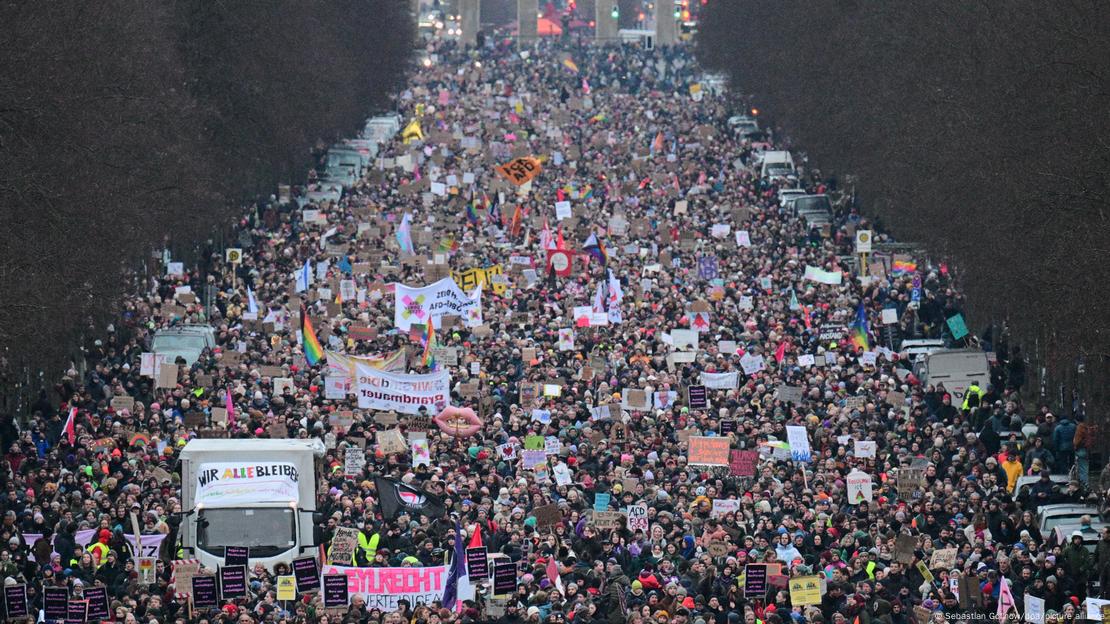
Published 28/02/2025 13:29 | Edited 28/02/2025 17:33
The Christian Democratic Union (CDU) began an offensive against civil society organizations and journalists a day after beating the elections in Germany. On Monday (24), the conservative bench sent to the government a questionnaire with 551 questions, questioning the political neutrality of entities that participated or supported the protests against the alliance between the CDU and the Alternative Right Party for Germany (AFD).
The action provoked immediate reactions of civil society parties and organizations, which classified the measure as an attack on democracy and a gesture of intimidation against critics of conservatism. The Social Democratic Party (SPD), which can integrate the governing coalition, warned that this posture can make negotiations difficult.
The CDU justifies the initiative claiming that NGOs and media vehicles that receive public funding would be promoting “party” actions, which would violate rules of tax neutrality.
The document mentions 18 organizations, including:
Grandmas against right – Grandparents against the right (Anti -fascist movement of older women)
Amadeu Antonio Stiftung – Amadeu Antonio Foundation (NGO that fights racism and right -wing extremism)
Correctiv – (Independent check and research platform)
Network research – Journalistic Research Network (Investigative Journalism Network)
Foodwatch – (Defense of consumer rights)
BUND – (German environmental federation, maintained acronym)
The consultation calls for information on the public financing of these entities and asks if they acted politically in recent protests. Some questions raised in the questionnaire include:
- “O SITE DA Grandparents against the right Can it be considered politically neutral? ”
- “How does Bundesregierung evaluate, in the light of tax neutrality rules, a Correctiv article on right -wing extremists at CDU?”
The inclusion of press vehicles in the questionnaire generated criticism. Netzwerk Recerche said the CDU “demonstrates total lack of understanding of the role of independent journalism,” while Correctiv has stated that its reports “follow strict journalistic standards and are based on documentary evidence.”
Reactions and criticism of the CDU initiative
The consultation was widely criticized by opposition parties, members of the future government and NGOs cited in the document. SPD leader Lars Klingbeil classified the action as a “dirty game” and warned that this type of conduct can undermine negotiations for government formation:
“We can’t sit down to discuss infrastructure investments in the morning and find out in the afternoon that CDU is sending this type of questionnaire,” he said.
Die Linke’s deputy Bünger called the document “revenge against anti -fascist protests,” stating that the offensive “remembers authoritarian states.”
Green Party’s MEPSPutada Sergey Lagodinsky has classified the measure as “an attack on civil society” and an indication of an “almost tricky climate.”
Amnesty International also criticized the action, stating that the CDU “treats progressive NGOs as political enemies and threatens its survival with unfounded accusations.”
Foodwatch, which was cited in the questionnaire, denied having any involvement with the protests:
“Our name appears randomly on this list, without having participated in any demonstration against the far right. This shows that CDU just wants to intimidate critical voices. ”
CDU adopts far right narrative
The CDU justifies the consultation stating that NGOs and media vehicles would be “politically aligned” to the SPD and green government, and that the supervision of these entities is necessary to ensure the proper use of public funding.
The claim, however, resonates conspiracy theories promoted by the far right. The conservative newspaper Die Welt, for example, suggested that Germany was being governed by a “deep state,” thesis widespread by Donald Trump and Jair Bolsonaro to attack democratic institutions.
The alternative to Germany (AFD) had already used this rhetoric in the past to suggest that progressive NGOs would be hidden arms of the government to manipulate public opinion. Now critics indicate that CDU is reproducing the same strategy, further narrowing their similarities to the far right.
Consultation follows model already used by AFD in 2022
This is not the first time a German party has tried to use Parliament to investigate critical NGOs and journalists. In 2022, AFD presented a similar appointment, questioning the financing of progressive NGOs and fact -checking platforms.
Sociology professor Matthias Quent, from the University of Magdeburg-Snstal, evaluates that the CDU is trying to restrict social mobilization:
“The tone, scope and content of the questions reveal a deep CDU discomfort with popular mobilization. In a moment of advancement from the far right, this kind of civil society intimidation is a worrying sign. ”
CDU expands radicalization and threatens democracy
The offensive against NGOs and journalists represents a new stage in the radicalization of CDU, which began to adopt tactics similar to those of AFD, Trump and Bolsonaro to delegitimize civil society and independent journalism.
The goal seems clear:
Create a narrative that progressive NGOs are political instruments of the SPD/green government.
Intimidating institutions that promote human rights, environmentalism and critical journalism.
Signalize to the conservative electorate that the CDU is “fighting left privileges”.
The impact of this strategy on the government’s future coalition and the democratic stability of Germany is still uncertain. But analysts warn: German democracy is being tested.
Source: vermelho.org.br

